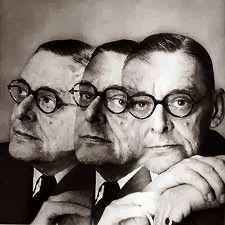There was a recent Firedoglake article about the
eleventh anniversary of the Iraq Invasion, particularly mentioning the numerous
respectable people who promoted and supported that invasion but who have not been held accountable.
One of the comments following the article had
immediate resonance with me because I have often had the same
thought, but which I think requires careful qualification.
Here is the comment:
it
is a great sadness contemplating the past. and the idiocies of so
many of my “friends”. all of whom were able to duck military
service. and there i was, a mennonite faced with either being drafted
or enlisting. in the indochina invasion era.
well,
no one i knew then is any less a “jingo” today. even women who
care about creating life seem to be keen on eliminating life. as long
as the lives are those of the wogs.
long
ago, i decided to do life solo. there was no way that i could endure
living with homicidal psychopaths.
and
that, in the main, is what the u.s. citizenry is. homicidal
psychopaths.
sure,
they attend church, you know. but they seem to have missed the
message of the new testament.
Now, I immediately recognize the thought of that.
The lesson of the Milgram Obedience Experiments seemed to be similar:
USA people would just as soon murder you as have a can of coca-cola.
The USA is filled with murderous maniacs, homicidal psychopaths.
Some of my European friends have spoken to me with
dismay and confusion about how it is that the “Americans,” as
they call USA people, do such horrible things, and yet they have met
some “Americans” who are good people.
I have a Swedish friend, a minister who studied at
Harvard Divinity School, who says this to me in a quizzical way:
“There are some good Americans.” She sees what the USA has done
in Viet-Nam, Iran, Iraq, South America, elsewhere, and throughout its
history, and she sees USA Christianists' enthusiasm for everyone
carrying guns and their electing Bush II a second time, but she also
sees “some good Americans.”
It is not easy to understand and to explain to
such a decent person as my Swedish minister how it is that half of
the USA considers giving health care to poor people as equivalent to
Nazi or USA extermination policy. And I don't think that personal,
psychological explanations are adequate to the task.
The problem is similar to racism. One of the
finest men I've know, a white man here in Dayton, says just the most
awful things about Blacks. He is intelligent, experienced, kind, yet
he is big into guns and not into Blacks. I've never seen him do an
unkind act.
I think the best explanation I can give to my
Swedish friend is that society has a group structure, as well as an
individual structure. That is, people sometimes do act as
individuals, but they also often act from the standpoint of a group.
And society consists of groups planning out and coordinating courses
of action as well as of individuals. Sometimes what you're seeing is
a person acting as a group member rather than what he himself is, the
way they do in gangs.
That's why they get all patriotic about going off
to wars and become 'homicidal psychopaths' toward you for raising
questions about the wisdom of the war-making. The first thing they
say is: “Whose side are you on?” They see you as lacking the
correct group identification. You're not a patriot. You are on the
enemy's side. You are to receive the same treatment therefore as the
enemy: extermination.
The fact that society has a group structure has
many other implications. One of those implications is that, if you
want a society to change its course, you often need to go through the
leaders of a group, who then bring along the followers toward the
change. It's not enough to go it on your own.


